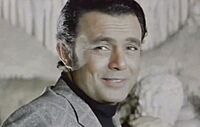Salah Zulfikar facts for kids
Quick facts for kids
ORE
Salah Zulfikar
|
|
|---|---|
| صلاح ذو الفقار | |
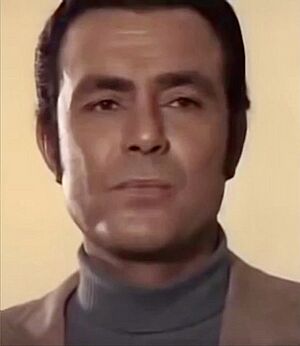
Zulfikar, c. 1971
|
|
| Born |
Salah El-Din Ahmed Mourad Zulfikar
18 January 1926 El Mahalla El Kubra, Kingdom of Egypt
|
| Died | 22 December 1993 (aged 67) Zamalek, Cairo, Egypt
|
| Resting place | Cairo, Egypt |
| Nationality | Egyptian |
| Other names |
|
| Alma mater | Egyptian Police Academy |
| Occupation |
|
| Years active | 1956–1993 |
| Organization |
|
|
Works
|
Full list |
| Height | 1.80 m (5 ft 11 in) |
| Spouse(s) |
Nafisa Bahgat
(m. 1947; died 1988)Zahret El-Ola
(m. 1957; div. 1959)Bahiga Mekbel
(m. 1976) |
| Children | Ahmed • Mona |
| Parents |
|
| Relatives |
|
| Family | Zulfikar family |
| Honours | Order of Sciences and Arts |
| Awards | Medal of Military Duty |
| Police career | |
| Allegiance | |
| Years of service | 1946–1957 |
| Rank | Lieutenant Colonel |
Salah El-Din Ahmed Mourad Zulfikar (صلاح ذو الفقار; born January 18, 1926 – died December 22, 1993) was a famous Egyptian actor and film producer. He first worked as a police officer in the Egyptian National Police before starting his acting career in 1956. He is known as one of the most important actors in the history of Egyptian movies.
Salah Zulfikar starred in over 100 films during his 37-year career, often playing the main character. He also performed in many plays and later had successful roles on television. In 1958, he started his first film production company with his older brother, Ezz El-Dine Zulficar. In 1962, he created his own company, Salah Zulfikar Films Company. Through his companies, he produced many successful films and won several awards. In 1996, to celebrate 100 years of Egyptian cinema, ten of his films as an actor and five as a producer were chosen among the top 100 Egyptian films of the 20th century.
Zulfikar was also a hero for Egypt during its fight against occupation. He participated in important battles while serving as a police officer. He received the Medal of Military Duty from Egyptian President Gamal Abdel Nasser for his brave service. He became one of the most famous artistic figures in Egypt and the Arab world, known for his work in film, television, and theater.
Contents
Early Life and Education
Salah El-Din Ahmed Mourad Zulfikar was born on January 18, 1926, in El Mahalla El Kubra, Egypt. His father, Ahmed Mourad Bey Zulfikar, was a senior police officer, and his mother, Nabila Hanem Zulfikar, was a housewife. Salah was the seventh of eight children. His father taught his children important values like commitment and honesty.
The Zulfikar family was also interested in arts and culture. Salah's brothers, Mahmoud Zulfikar and Ezz El-Dine Zulficar, became famous filmmakers. Salah was a great student and an athlete. He was a boxing champion in Egypt, winning the King's Cup in 1947. He also played football for the Police Academy team.
He first studied medicine to make his father happy. But when his father became ill, Salah moved to the Police Academy in Cairo to be closer to him. He graduated in 1946 and then worked as a police officer and a teacher at the Police Academy.
Police Career and Heroism
While at the Police Academy, Zulfikar fought in the guerrilla war against the British in Ismailia in 1944. After graduating in 1947, he worked with the police in Monufia and later in Cairo Prison.
In 1949, Zulfikar became a professor at the Police Academy. He was known as a skilled and professional officer.

In 1952, he bravely volunteered to join the police unit in Ismaïlia that was under attack by the British Army. The Egyptian police refused to give up their weapons, leading to the Battle of Ismailia. This battle is celebrated every year on January 25 as National Police Day in Egypt. Zulfikar received an award for his courage.
During the 1956 Suez War, Zulfikar led 19 of his students to volunteer as commandos against the British, French, and Israeli armies. For his bravery, President Gamal Abdel Nasser awarded him the Medal of Military Duty (first class).
Acting Career Highlights
Salah Zulfikar's older brothers, Ezz El-Dine Zulficar and Mahmoud Zulfikar, were film directors. They encouraged him to try acting. At first, he refused because of his police job.
But in 1955, he agreed and got a special permit to star in Wakeful Eyes (1956). His second role was in Return My Heart (1957), which made him very popular. After these successes, he decided to become a full-time actor in late 1957, leaving his police career.
Becoming a Star in the 1950s
His film Return My Heart (1957) was a big success and told the story of the Egyptian revolution of 1952. It is still celebrated on Egyptian television.
In 1958, he starred in Jamila, the Algerian (Gameela), which showed the Algerian people's fight against French rule. In 1959, he appeared in six films, including The Second Man, which earned him great reviews. He also starred in Forbidden Women, a box-office hit. His first film as a producer, Among the Ruins (1959), was also a success.
Stardom in the 1960s
Zulfikar chose many different roles, which made him even more popular. In 1960, he starred in the thriller I Accuse.
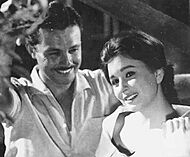
He also worked with Soad Hosny for the first time in Money and Women (1960), which was a commercial success. In 1961, he starred in six films, including the romantic comedy That's What Love Is. He also played his first villain role in Me and My Daughters (1961).
In 1963, his role as Issa El Awam in Saladin the Victorious was highly praised. The same year, he played Doctor Hamooda in Soft Hands, for which he won a state award for best actor. This film was even shown at the 14th Berlin International Film Festival in 1964.
Zulfikar also acted in the Italian film Secret of the Sphinx (1964). On stage, he made his debut in the play A Bullet in the Heart (1964), which ran for a whole year.
The romantic drama Dearer than My Life (1965) was a huge success, and his performance is considered one of his best. He won another state award for best actor for this role.
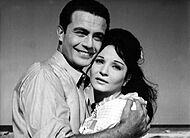
He starred in three popular romantic comedies with Shadia: My Wife, the Director General (1966), My Wife's Dignity (1967), and My Wife's Goblin (1968). All three were very successful.
Success in the 1970s
In the 1970s, Zulfikar continued to be a very popular star. He starred in My Husband's Wife (1970) and received praise for his role in the political thriller Sunset and Sunrise (1970).
He appeared in many films in 1972, including A Call for Life and Paris and Love, which was a big hit in Lebanon. He also worked with Soad Hosny again in Those People of the Nile. On stage, he starred in the comedy A Bachelor and Three Maidens (1972).
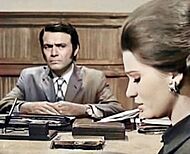
In 1973, he had a successful role in the psychological drama The Other Man. He also played King Horemheb in the short film Nefertiti and Akhenaton (1973) in Mexico. In 1974, he starred in the comedy In Summer We Must Love.
He also had great success in television series, especially The Return of the Spirit (1977), which was very popular in Egypt and the Arab world.
Career Peak in the 1980s
Zulfikar's films and TV shows continued to be successful in the 1980s. He focused more on television roles during this time. In 1981, he starred in I'm Not Lying But I'm Beautifying and the dramatic film Secret Visit, for which he won another state award for best actor.
In 1982, he won his second consecutive state award for best actor for his role in the crime thriller The Peacock. He then took a break from films for three years, focusing on television series like Dalia the Egyptian (1982), where he played the director of the Egyptian intelligence service.
He returned to films in 1985 with Adieu Bonaparte, which was praised by French critics. In 1988, he starred in several films, including the popular Monsieur le Directeur and the crime thriller Days of Terror.
Massive TV Success in the 1990s
Zulfikar's career got a new boost with the miniseries The Family of Mr Shalash (1990), which became an Egyptian television classic. In 1991, he starred in the crime thriller Wicked Game.
Final Roles
His last television role was in The Final Return (1993). He also appeared in three films released after his death in 1994: Road to Eilat, The Terrorist, and Five-Star Thieves. In Road to Eilat, he played Admiral Fouad Mohamed Abou Zikry, the head of the Egyptian Navy. In The Terrorist, he played Dr. Abdelmoneim, the head of a family.
Film Production Career
Early Productions (1958–1962)
In 1958, Salah Zulfikar and his brother Ezz El-Dine Zulficar started a film production company called Ezz El-Dine Zulficar Films Company. Salah managed the business side.
Their first film was Among the Ruins (1959), which was a critical and commercial success. It was later listed among the Top 100 Egyptian films. They also produced The Second Man (1959), where Salah Zulfikar played two roles.
In 1960, they produced Angel and Devil and The Holy Bond, which became an Egyptian classic. Their film Struggle of the Heroes (1962) was also listed in the Top 100 Egyptian films.
Salah Zulfikar Films (1962–1975)
In 1962, Salah Zulfikar started his own company, Salah Zulfikar Films Company. He said he considered film production his hobby and only produced films he truly believed in.
His new company's first film was Appointment at the Tower (1962), starring Salah Zulfikar and Soad Hosny, which was a box office hit. They also produced I am the Fugitive (1962) and Letter from an Unknown Woman (1962), both successful.
In 1966, Salah Zulfikar Films produced My Wife, the Director General. This film was a big success and became a classic. It showed a woman as a director over men, which was important at the time. Zulfikar won the award for best film producer for this movie.
In 1969, his company produced A Taste of Fear, starring Shadia. This film was initially banned but was later allowed to be released by President Gamal Abdel Nasser himself. It won awards and was listed among the Top 100 Egyptian films.

Salah Zulfikar was also the executive producer for The Other Man (1973), in which he also starred. His company's last film production was I Want a Solution (1975), starring Faten Hamama. This film was very important because it helped change the law in Egypt to give women more rights in divorce. Zulfikar won his second best producer award for this film, and it was also listed in the Top 100 films of Egyptian cinema.
Death
Salah Zulfikar passed away suddenly from a heart attack on Wednesday, December 22, 1993, at the Police Hospital in Cairo. His funeral was held at the Umar Makram Mosque, and he was buried in the Zulfikar family cemetery in Cairo.
Honours
| Ribbon bar/Medal | Country | Honour |
|---|---|---|
| Order of the Republic (Grand Cordon) | ||
| Order of Sciences and Arts (1st class) | ||
| Medal of Military Duty (1st class) |
Acting Style and Legacy
Critics often praised Salah Zulfikar for his natural and convincing acting. In 1965, a critic wrote about Dearer than My Life, saying that Zulfikar's performance was so good it could make people cry. Another review in 1976 said he was a "camouflage actor" who could play any type of role.
Film critic Tarek El Shennawi said that Salah Zulfikar was a "genius and talented actor" who mastered roles in drama, comedy, and action. He was known for his discipline, integrity, and leadership. His success as both an actor and a producer earned him the nickname "The Genius."
Salah Zulfikar was also a national hero. His son, Ahmed Zulfikar, mentioned his father's bravery in the guerrilla war against the British in 1944 and his participation in the Battle of Ismailia in 1952 and the 1956 Suez War. He was admired by police officers for his courage. In the Cairo Citadel's police museum, there is a large photo of Salah Zulfikar and his colleagues, honoring the heroes of the 1952 Battle of Ismailia.
He was considered a cultural icon and a male sex symbol. He worked with many leading actresses of his time, including Mariam Fakhr Eddine (13 films), Nelly (7 films), Shadia and Sabah (6 films each), and Soad Hosny (5 films).
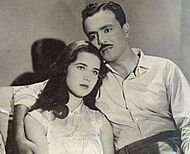
Salah Zulfikar was a consistent box-office success for over two decades. He was also a strong supporter of women's rights, showing his beliefs through the films he produced.
In Cairo, two streets are named after Salah Zulfikar. Many celebrations have taken place in his honor, and he has received awards after his death. In 2022, the Cairo Opera House held a seminar celebrating the legacy of Salah Zulfikar and his brothers.
Awards
Salah Zulfikar received many awards during his career:
- 1963: State Award for Best Actor for Soft Hands.
- 1965: State Award for Best Actor for Dearer than My Life.
- 1966: State Award for Best Producer for My Wife, the Director General, which also won Best Film from the Catholic Center Film Festival.
- 1967: State Award for Best Actor for My Wife's Dignity.
- 1975: State Award for Best Producer for I Want a Solution.
- 1979: Honorary Certificate of Appreciation from President Anwar Sadat.
- 1981: State Award for Best Actor for Secret Visit.
- 1982: State Award for Best Actor for The Peacock.
- 1991: Special Jury Award from Cairo International Film Festival.
- 1994 (posthumous): Honorary Award for his life's work from the National Egyptian Film Festival.
Personal Life
Salah Zulfikar was married four times. His first wife was Nafisa Bahgat, whom he married in 1947. They had a son, Ahmed, and a daughter, Mona. Nafisa remained his wife until her death in 1988. His son Ahmed became a businessman, and his daughter Mona became a well-known lawyer.
His second marriage was to actress Zahret El-Ola in 1957, but they divorced two years later. His most famous marriage was to the singer and actress Shadia, whom he married in 1964. They worked together on many successful films. Their marriage ended after seven years. Later, he married his last wife, Bahiga, and they remained married until his death in 1993.
Besides boxing, Salah Zulfikar loved football and supported Zamalek S.C.
Filmography
Salah Zulfikar had a long and successful career in the Egyptian film industry for 37 years. He was a film producer and an actor in films, plays, television, and radio. He appeared in many feature films, short films, and TV series, often working with the most famous actresses of his time. As a producer, he made fifteen films, most of which were very successful. He left behind a huge legacy with over 250 acting credits and many successful productions.
Images for kids
 | Georgia Louise Harris Brown |
 | Julian Abele |
 | Norma Merrick Sklarek |
 | William Sidney Pittman |


